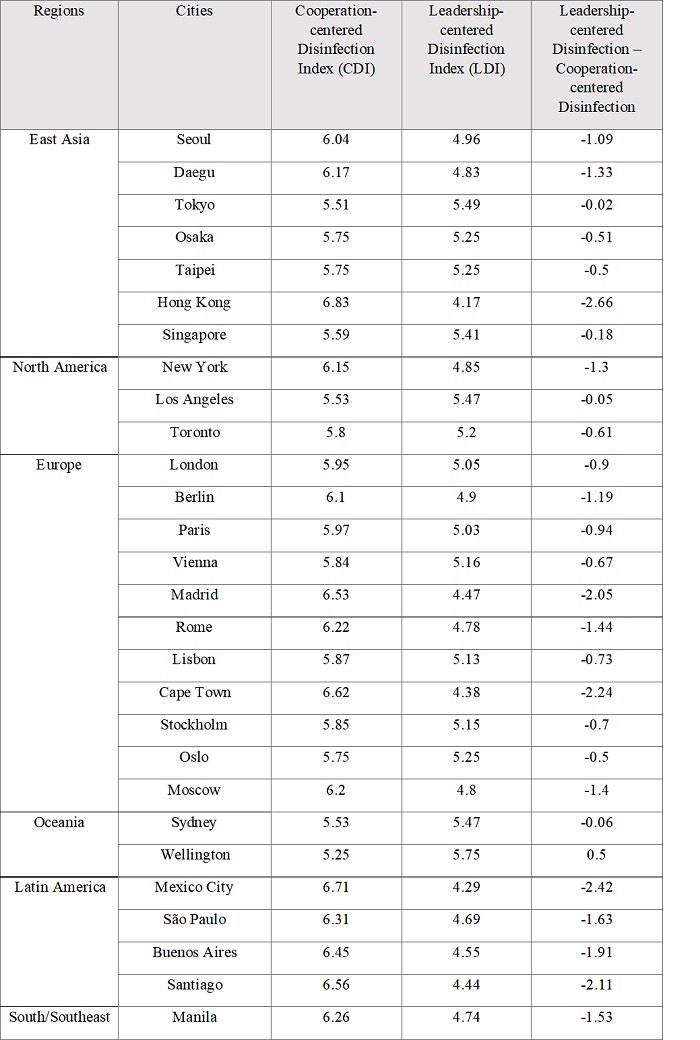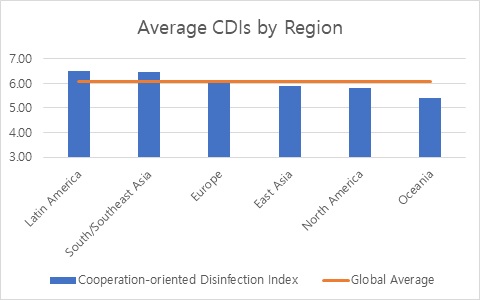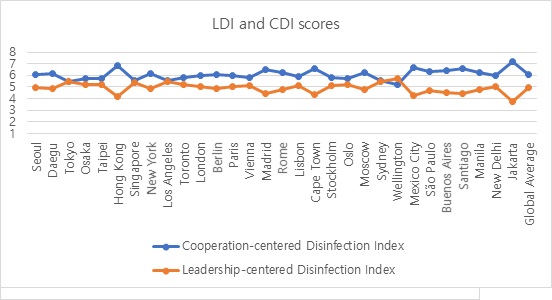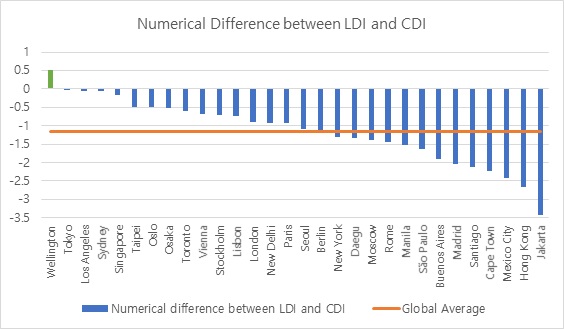Preference Between Leadership-centered Disinfection and
Cooperation-centered Disinfection by Global Citizens
1.
Background
Governments
around the globe are driving social distancing, self-quarantine, personal
hygiene campaigns, and introducing policies such as wearing masks
in high-risk facilities, canceling a visa waiver in Jeju, and so on. These
recommended and mandatory measures initiated by governments are slowing down
the spread of the epidemic virus, but can the coronavirus be stopped only by
these government policies and campaigns? Experts stressed the importance of
citizens’ practice over the disease control, and if it were not for citizen
active participation, Daegu’s fast spread of the infectious disease would have
not been alleviated. In this section, we will look at how global citizens think
of the role of governments and citizens in containing the epidemics.
2.
Research
Topic
If a government’s leadership or citizens’
cooperation is critical to disease prevention is asked to citizens of 30 global
cities. This section will explain the data analysis on this topic.
3.
Questionnaire
Used
Survey Question II-3: “The options below
show two divergent opinions about how to respond to the recent state of
emergency. On a scale from 1-10, please identify the point you feel most
closely matches your opinion. The government’s strong leadership is the main
key to recover from a disaster and the citizens’ active trust and cooperation
is the main key to recover from a disaster.”
The answers consist of a 10-point scale,
with higher scores indicating an individual who emphasizes more on the citizens’
role and lower scores demonstrating a person who underlines a government’s
leadership.
4.
Major
Outcomes
Table 1: Leadership-centered Disinfection
Index (LDI) and Cooperation-centered Disinfection Index (CDI)
by Citizens of 30 Global Cities

Respondents are asked to choose one score
to represent their ideas on the question, and the average scores of each city
indicate the Cooperation-centered Disinfection Index (CDI). Cooperation-centered
Disinfection Index (CDI) demonstrates that citizens of a city consider the
cooperation among them the main key to weather the disaster, and the higher the
score is, the more an individual think highly of the collaboration in the
society. Meanwhile, the reverse scaling was used in the Leadership-centered
Disinfection Index (LDI), which means that 11 minus CDI is the Leadership-centered
Disinfection Index (LDI). Similar to the CDI, the higher the LDI score is, the
more a citizen highlights the leadership of a government. Finally, the numerical
differences between the two scores were calculated in order to show whether a
government or civil society is put more emphasis by citizens. To illustrate, the
lower a numerical difference is, the more citizens of the city underline the
cooperation among people to overcome the pandemic crisis.
Table 2: Average Cooperation-centered
Disinfection Index (CDI) by Region
|
Regions
|
Average Cooperation-centered Disinfection Index (1 –
10)
|
|
East Asia
|
5.89
|
|
Southeast/South Asia
|
6.48
|
|
North America
|
5.83
|
|
Oceania
|
5.39
|
|
Latin America
|
6.50
|
|
Europe
|
6.08
|
The scores in the
table are the average Cooperation-centered
Disinfection Index (CDI) of
the global citizens by region. To be specific, the lowest score of 5.39 was
rated by Oceanian citizens on average. It exhibits that people in this region
tend to deem that the government’s capacity is vital at a time of crisis. On
the contrary, the highest score of 6.50 was rated by Latin American citizens,
which illustrates that people here highlight the most on citizenship than the government’s
directorship.
Figure 1: Bar Graph of Average Cooperation-centered
Disinfection Index (CDI) by Region

Figure 1 is the
visualized graph of Table 2, and the orange line is the world average Cooperation-centered
Disinfection Index (CDI).
That Latin America is the most supportive of the citizen-centered disinfection
is evidenced by the figure. On the other hand, Oceania shows the least enthusiasm
about citizens’ mutual efforts. For further analysis, let’s see each city’s
score of CDI and LDI.
Figure 2: Line Graph of Citizen-centered
Disinfection Index (CDI) and Government-centered Disinfection Index (GDI)

This figure is a visualized version of
Table 1, and the most
outstanding finding of Figure 2 is that most of CDIs are higher than LDIs. It demonstrates
that citizens generally regard that the citizens’ participation in disinfection
is playing an important role during the state of emergency. However, citizens
in Wellington think highly of the government’s role and they believe that it is
easier for a country to hurdle the crisis under the good guidance of a
government.
Figure 3: Bar Graph of Numerical Difference
between Cooperation-centered Disinfection Index (CDI) and Leadership-centered
Disinfection Index (GDI)

The differences
between LDIs and CDIs are drawn as a bar graph, shown in Figure 3. The orange
bar indicates the global average difference score (-1.15). The bigger the
difference scores, the more citizens are weighing on the government leadership in
the middle of the pandemic. Accordingly, since the global average is a negative
number, and all cities except Wellington present negative numbers, and hence, global
citizens assume that the citizens rather than governments are decisive actors
during the COVID-19. Besides, citizens in Jakarta show the highest interest in
citizens’ cooperation, and all cities in Latin America are accenting more on citizen’s
role than the global average.
5.
Summaries
and Further Tasks
a.
Generally
speaking, global citizens regard the citizens’ cooperation as important during
the COVID-19.
b.
Global
citizens prioritize the role of citizens than rule by governments during the
crisis since the numeric difference scores of Leadership-centered Disinfection
Index (LDI) and Cooperation-centered Disinfection Index (CDI) are negative, except
Wellington.
c.
South/Southeast
Asian and Latin American average CDIs are higher than the global average,
indicating these regions are more underscoring citizenship to get over the
epidemic crisis.
d.
The
study is limited to descriptive research, and therefore, a more detailed
explanative investigation is required to further understand the global citizens’
consciousness presented above. For instance, why citizens in Wellington believe
that the government’s leadership is more crucial during the crisis when other
citizens reckon that citizens’ cooperation is more vital? Why people in New
York are having less affection for the government’s role when Los Angeles
citizens show less concern about citizens’ collaboration?
|